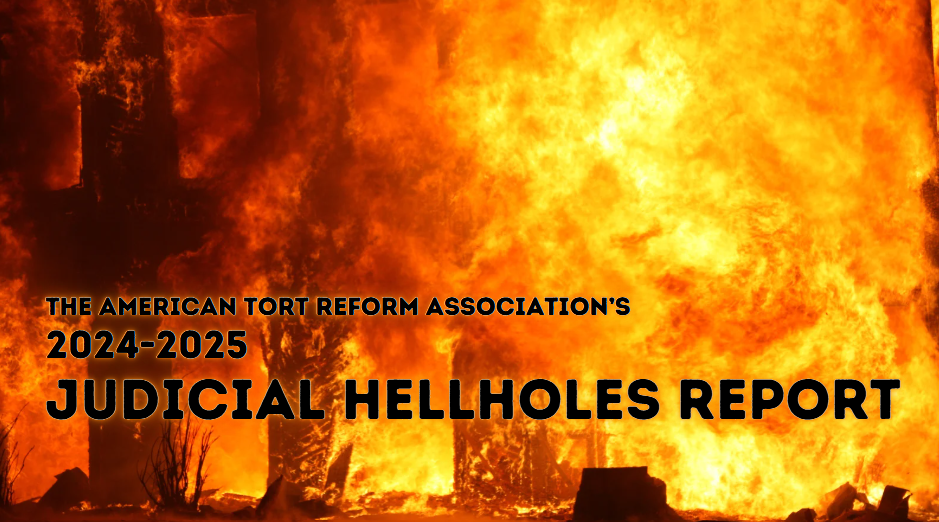By Gerald L. Maatman, Jr.
Duane Morris Takeaways: The American Tort Reform Association (“ATRA”) annually publishes its “Judicial Hellholes Report,” focusing on litigation issues and identifying jurisdictions likely to have unfair and biased administration of justice. The ATRA recently published its 2024-2025 Report and one of the top-ranking states from 2023 maintained its #1 position for 2024 – Pennsylvania, specifically the Pennsylvania Supreme Court and the Philadelphia Court of Common Pleas – as the most challenging venue for defendants. Readers can find a copy here and the executive summary here.
The Judicial Hellholes Report is an important read for corporate counsel facing class action litigation because it identifies jurisdictions that are generally unfavorable to defendants. The Report defines a “judicial hellhole” as a jurisdiction where judges in civil cases systematically apply laws and procedures in an unfair and unbalanced manner, generally to the disadvantage of defendants. The Report is a “must read” for anyone litigating class actions and making decisions about venue strategy.
The 2024 Hellholes
In its recently released annual report, the ATRA identified 10 jurisdictions on its 2024 hellholes list – which, in order, include: (1) Pennsylvania (especially in the Philadelphia Court of Common Pleas and the Supreme Court of Pennsylvania); (2) New York City (with unique state laws and lawsuit abuses); (3) South Carolina (particularly due to a bias against corporate defendants in asbestos litigation); (4) George (tied for #1 in 2023, the state has seen nuclear verdicts and endless liabilities for defendants); (5) California (with a huge overall volume of lawsuits, huge verdicts, Private Attorney General Act (PAGA) litigation, lemon law litigation, and high-stakes environmental litigation); (6) Cook County, Illinois (with no-injury claims filed under the state’s Biometric Information Protection Act (BIPA) and being a hotbed for asbestos litigation); (7) St. Louis, Missouri (with focuses on junk science in the courtrooms and nuclear verdicts); (8) the Michigan Supreme Court (particularly due to liability-expanding decisions and pro-plaintiff legislative activity); (9) King County, Washington (a first appearance on the list due to trial courts conducting unfair group trials, allowing junk science into evidence, and swapping to other state laws when favorable to plaintiffs); and (10) Louisiana (with long-running costal litigation and nuclear verdicts against defendants).
According to the ATRA’s analysis, these venues are less than optimal for corporate defendants and often attract plaintiffs’ attorneys, particularly for the filing of class action lawsuits. As a result, corporate counsel should take particular care if they encounter a class action lawsuit filed in one of these venues.
The 2025 “Watch List”
The ATRA also included one jurisdiction on its “watch list” — the Texas Court of Appeals for the Fifth District, which had three noteworthy decisions overturned by the Texas Supreme Court that would have expanded liability to defendants. The ATRA emphasized the need for oversight of this appellate court to ensure that it does not deviate from Texas precedent.
The 2025 “Dishonorable Mentions”
The ATRA included a few jurisdictions on its “dishonorable mentions” list, for making unsound decisions, engaging in abusive practices, or other actions that “erode the fairness of a state’s civil justice system.” The venues on the list include the Maryland Supreme Court, following a ruling which rejected a higher standard for expert evidence; Tennessee, as a new hotspot for abusive Americans with Disabilities Act Litigation; and Illinois courts where asbestos claims remain prevalent.
Points Of Lights
In addition, the ATRA recognized that several jurisdictions made significant positive improvements this year, highlighting decisions by the Third Circuit, which ruled that lawsuits alleging insufficient warnings on product labels, even with federal approval, cannot proceed; the Kentucky Court of Appeals, which overturned a previous problematic ruling for defendants; and the Utah Supreme Court, which upheld the state’s statute of repose for medical liability lawsuits.
Implications For Employers
The Judicial Hellholes Report often mirrors the experience of companies in high-stakes class actions, as Pennsylvania, New York, South Carolina, Georgia, California, Illinois, Missouri, Michigan, Washington, and Louisiana are among the leading states where plaintiffs’ lawyers file class actions. These jurisdictions are linked by class certification standards that are more plaintiff-friendly and more generous damages recovery possibilities under state laws.

